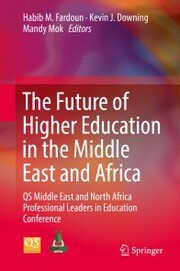Detailansicht
The Future of Higher Education in the Middle East and Africa
eBook - QS Middle East and North Africa Professional Leaders in Education Conference
ISBN/EAN: 9783319646565
Umbreit-Nr.: 4811946
Sprache:
Englisch
Umfang: 0 S., 4.07 MB
Format in cm:
Einband:
Keine Angabe
Erschienen am 26.03.2018
Auflage: 1/2018
E-Book
Format: PDF
DRM: Digitales Wasserzeichen
- Zusatztext
- <div>This book addresses some of the challenges posed by the globalization of higher education. It examines the emergence and resulting challenges of English as Lingua Franca (ELF) and of the decision to use English as the Medium of Instruction (EMI) as part of a strategic policy of internationalization. It looks at survival challenges caused by globalization and expansion, the diversity challenge, the concept of marginality and how marginality can lead to creativity, teaching and encouraging entrepreneurialism, the tools needed for internationalizing higher education in developing countries, innovative approaches, the intelligent use of technology, and finally, the value of non-constraint engagement in driving teaching and course quality improvements.<br></div><p>The expansion of higher education and the increasingly international body of students and staff continue to inspire and drive the development of global higher education systems. Whilst these systems began locally, many are now engaging with the challenges of retaining their local flavour whilst embracing the march of globalisation. The challenge is to find local solutions that also meet the requirements of the rapid development of what might be termed the massification of international higher education. This book reflects these contemporary challenges through its variety of topics taken from countries as diverse as Hong Kong, Panama, South Africa, USA and Saudi Arabia. The topics are as diverse as some of the local solutions but each chapter represents a response to a rapidly changing global landscape.</p>
- Kurztext
- This book addresses some of the challenges posed by the globalization of higher education. It examines the emergence and resulting challenges of English as Lingua Franca (ELF) and of the decision to use English as the Medium of Instruction (EMI) as part of a strategic policy of internationalization. It looks at survival challenges caused by globalization and expansion, the diversity challenge, the concept of marginality and how marginality can lead to creativity, teaching and encouraging entrepreneurialism, the tools needed for internationalizing higher education in developing countries, innovative approaches, the intelligent use of technology, and finally, the value of non-constraint engagement in driving teaching and course quality improvements. The expansion of higher education and the increasingly international body of students and staff continue to inspire and drive the development of global higher education systems. Whilst these systems began locally, many are now engaging with the challenges of retaining their local flavour whilst embracing the march of globalisation. The challenge is to find local solutions that also meet the requirements of the rapid development of what might be termed the 'massification' of international higher education. This book reflects these contemporary challenges through its variety of topics taken from countries as diverse as Hong Kong, Panama, South Africa, USA and Saudi Arabia. The topics are as diverse as some of the local solutions but each chapter represents a response to a rapidly changing global landscape.
- Autorenportrait
- <p><b>Habib M. Fardoun</b></p><p>Dr. Habib M. Fardoun has a PhD in Model-Based Approach for the Development of Quality Higher Educational Environments (2011), and Master in Aptitude for Teaching (2008), and Master in Advanced Computer Technologies (2007), by the University of Castilla-La Mancha. Currently, he is occupying the position of Director of KAU Observatory Unit for Academic Ranking and Excellence, Consultant of the Vice-President for Development for the University International Relationships and Rankings, and as Associate Professor at the Faculty of Computing and Information Technology, at the King Abdulaziz University (Jeddah, Saudi Arabia).</p><p></p> With several years of experience on effective solutions for the improvement of universities rankings, Habib has diversified his work along many areas that are key factors in the improvement of the overall academic and research reputation. And, gained the experience of the creation of long/short-terms strategic plans and management towards excellence.<p></p><p> </p><p><b>Kevin J. Downing</b></p><p>Dr. Kevin Downing is Director of Knowledge, Enterprise and Analysis at City University of Hong Kong. His portfolios have included strategic and academic planning, institutional research, quality assurance and liaison with the Universities Grants Committee. Dr. Downing is a Chartered Psychologist and Chartered Scientist with a current Licence to Practice, and Associate Fellow of the British Psychological Society with wide international experience, including senior academic posts in Europe and Asia.</p>His published work centres on psychology, education and metacognitive development and he is Editor-in-Chief of the SSCI and SCOPUS listed journal Educational Studies. He has helped successive Presidents reshape City University, taking them from 198th in 2004 to 95th in the 2012 QS World University Rankings.<p></p><p></p><p><b><br></b></p><p><b>Mandy Mok</b></p><p>Singaporean Mandy Mok has a UK university education in graphic design and a Masters degree in strategic marketing from a major Australian university. She ran her own successful advertising and marketing company in Singapore before joining QS in 2002 to lead its growth in Asia. She has responsibility for the business development of the World MBA Tour, World Grad School Tour, topuniversities.com, Star Ratings, Benchmarking, Consulting and all associated products throughout Asia, Middle East and Africa.</p>Mandy inspired the launch of, and has operational responsibility for, the QS Asia Pacific Professional Leaders in Education Conference (QS-APPLE), QS Middle East and Africa Professional Leaders in Education Conference and Exhibition (QS MAPLE), the QS WorldClass Seminar, the series of QS in conversation seminars and QS Subject Focus Summits.<p></p><p></p><p> </p><p><br></p>
